Importance of fitness As We Age
The importance of fitness as we age cannot be overstated. As we grow older, our bodies become less efficient, and we become more prone to injury and illness. While the aging process is inevitable, there are many ways that we can maintain our fitness and health as we age. One of the most important things that we can do for our bodies as we age is to stay physically active. Exercise helps to keep our muscles and bones strong, and it also helps to improve our overall health and well-being. Staying active also helps to reduce the risk of developing certain age-related illnesses such as diabetes, heart disease and osteoporosis.
A good way to start a physical activity program is to begin with low-impact activities such as walking, swimming, and yoga. These activities help to improve flexibility, balance, and coordination. As we become more comfortable with these activities, we can then move on to more strenuous activities such as running, biking, and strength training. It is important to remember that our bodies change as we age, so it is important to adjust our exercise routine accordingly. For example, our joints and muscles may become weaker and more prone to injury as we age, so it is important to focus on low impact activities such as swimming and yoga. It is also important to make sure that we are properly stretching and warming up before engaging in any physical activity.
In addition to physical activity, it is important to maintain a healthy diet as we age. Eating a healthy, balanced diet helps to keep our bodies strong and our minds sharp. This includes eating plenty of fruits and vegetables, lean proteins, and whole grains. It is also important to limit our intake of processed foods, sugar, and saturated fats. Staying well-hydrated is also important for our body’s health as we age. The average adult should aim to drink at least eight glasses of water per day. Water helps to flush out toxins from our bodies, and it also helps to keep our joints and muscles lubricated.
Finally, it is important to get regular medical check-ups. As we age, our bodies become more susceptible to illness and injury, so it is important to get regular check-ups with our doctor. During these check-ups, our doctor can assess our overall health and make sure that we are not at risk for any age-related medical conditions.
Importance of strength training as we age
Strength training is an important component of any fitness program, especially as we age. As we get older, our muscles naturally become weaker and less responsive to physical activities. Strength training can help counteract this natural decline and keep us strong and healthy. Strength training has a number of benefits for aging adults, it can help reduce the risk of injury, improve balance and coordination, increase bone density, and reduce the risk of chronic health conditions.
Additionally, strength training can help boost energy levels and reduce the risk of falls and fractures. Strength training is especially important for older adults who are at risk for osteoporosis. This debilitating condition is caused by a decrease in bone mass, causing bones to become brittle and easily breakable. Strength training can help increase bone density and reduce the risk of developing osteoporosis.
When it comes to strength-training exercises, the best ones for aging adults are those that focus on balance, coordination, and range of motion. These types of exercises target all of the major muscle groups, including the legs, back, arms, and core. Examples of these exercises include squats, lunges, and bicep curls. Additionally, body weight exercises such as planks, push-ups, and sit-ups are all great options for aging adults.
When starting a strength training program, it’s important to start slowly and gradually increase the intensity and duration of your workouts. It’s also important to talk to your doctor before starting any new exercise program, especially if you have any existing medical conditions. Strength training is an important part of any fitness program, especially for aging adults. It can help reduce the risk of injury and chronic health conditions, increase bone density, and boost energy levels. Additionally, strength training can help improve balance and coordination, which is especially important for preventing falls and fractures. With the right program and the right form, strength training can help keep you strong and healthy as you age.
Importance of Protein consumption as we get older
Protein is one of the most important nutrients for maintaining good health as we age. As we age, our bodies become less efficient at producing proteins and other essential nutrients, so it is important to ensure that we are getting enough protein from our diet. Protein helps to maintain and repair muscle tissue and organs, and it is also essential for producing hormones and enzymes. It is also important for maintaining bone and joint health.
As we age, our bones become weaker and more prone to injury, so getting enough protein is essential for bone health. It is recommended that adults over the age of 50 should be consuming between 0.5 and 1 grams of protein per pound of body weight each day. This means that a person who weighs 150 lbs. should be consuming between 75 and 150 grams of protein per day. Good sources of protein include lean meats such as chicken, fish, and turkey; eggs; dairy products; legumes; nuts and seeds; and whole grains. It is important to ensure that we are getting a variety of different protein sources in our diet, as each type of protein provides different benefits. In addition to getting enough protein in our diet, it is also important to make sure that we are getting enough exercise as we age. Regular exercise helps to maintain muscle and bone strength, and it can also help to reduce the risk of certain age-related illnesses.
- Personal Training
12 Week Customized Personal Training Program
- Exercise Equipment
Bowflex Adjustable Dumbbells
- Exercise Equipment
Home Gym
- Exercise Equipment
Loop Exercise Bands
- Exercise Equipment
Resistance Bands






